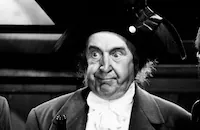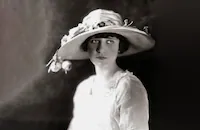The Ruling Voice

Brief Synopsis
Cast & Crew
Rowland V. Lee
Walter Huston
Loretta Young
Dudley Digges
David Manners
Doris Kenyon
Film Details
Technical Specs

Synopsis
Because of a racketeering group known as The System, which demands protection money from grocery store owners, food prices are so high that many people cannot afford to eat. The head of The System is Jack Bannister, who has grown rich enough from his illegal activities to send his daughter Gloria to Europe for her schooling. When a committee of businessmen is formed to break Bannister's power, he blackmails one of them, Andrew Gregory, into acting as his spy. Unable to betray the committee, Gregory commits suicide. When Gloria returns from Europe, she tells her father that she is engaged to Dick Cheney, who is from a socially respectable but impoverished family. Gloria is worried that Dick's family will not think she is good enough for him, so she quizzes Bannister about his business. He decides to tell her the truth. She is horribly upset and, refusing to live on money earned illegally, insists she will get a job. Realizing he cannot change her mind, Bannister asks Mary Stanton, a socialite who owes him a favor, to hire Gloria as a French tutor for her small son, without revealing his part in the matter. Mary, who is secretly working for the committee, agrees. Meanwhile, The System goes to war with the Consolidated Milk Company after they refuse to pay protection money. Consolidated threatens to kidnap Gloria if Bannister does not stop the war, but the conflict has gone too far for one man to control. When Gloria learns what is happening from Mary, she brings Mary and her son Malcolm to the Bannisters for protection. Bannister finally stops the war when he threatens to turn The System's books over to the district attorney. Snead, Bannister's second in command, decides to eliminate his boss. He sends a man who had been broken by Bannister to deliver a message. After the man recognizes Bannister's voice, they struggle and Bannister is killed. With Bannister gone, The System is smashed.

Director
Rowland V. Lee
Cast

Walter Huston

Loretta Young

Dudley Digges

David Manners

Doris Kenyon

John Halliday
Willard Robertson

Gilbert Emery

Douglas Scott
Crew
George Amy
Thomas Brannigan
John Ellis
Michael Joyce
Donald W. Lee
Rowland V. Lee
Robert Lord
David Mendoza
R. G. Mitchell
Byron Morgan
Jack Okey
Sol Polito
Thomas Riddell

Film Details
Technical Specs

Articles
The Ruling Voice
Willard Robertson, realizing that Walter Huston is the gangster behind his son's murder, in The Ruling Voice
The same year Warner Bros. was blazing trails with its depiction of vicious working class gangsters in Little Caesar and The Public Enemy (both 1931), Walter Huston showed the opposite end of the social spectrum as an executive-level gang boss in this production from Warners subsidiary First National. Although The Ruling Voice (1931) lacked the groundbreaking realism of the other two gangster pictures -- Huston is brought down by his love for his daughter (Loretta Young) -- some unique storytelling touches and the stars' simple, realistic acting lent it a distinction all its own.
Huston had arrived in Hollywood in 1929, part of the wave of New York actors imported to the screen with the arrival of talking films. He always credited the movies with helping him refine his craft and make his acting style more naturalistic. If that's the truth, he had already learned his lesson by the time The Ruling Voice came around. His simple, honest performance as a gangster fighting for respectability anticipates the corporate screen gangsters of the '70s and '80s, making the film, at least in terms of characterization, far ahead of its time. And he achieved this while chomping at the bit over his restrictive studio contracts, which forced him to make four clinkers for every decent film, suffering through the end of his second marriage and worrying whether his son, future director John Huston, would ever find his place in the world (it was during this time period that Walter tried to get John a writing contract in Hollywood).
Matching him in believability was Loretta Young as his daughter, a young innocent unaware of her father's true profession until he reveals it to her on the eve of her engagement to a society playboy. Young was the workhorse of the Warner Bros. lot in this period. The Ruling Voice was the eighth of nine features she would make that year, playing everything from young business women on the rise (Three Girls Lost and Big Business Girl) to an experienced news hen (Platinum Blonde). And she did it all with freshness and style, even while facing a divorce of her own (from actor Grant Withers).
That even smaller roles played by Dudley Digges, David Manners, Doris Kenyon and, especially, Willard Robertson were simply and realistically played is probably a tribute to the work of director Rowland V. Lee. Although his career was too varied to establish a strong on-screen personality, Lee was responsible for too many memorable screen moments to be dismissed as just another studio workhorse. He would direct Young in one of the films that made her a star -- the poetic, atmospheric Zoo in Budapest (1933) -- and turn in two memorably stylized horror films Son of Frankenstein and Tower of London (both 1939).
One of his most effective touches in The Ruling Voice is the use of newspaper headlines to frame the story. Warner Bros. always advertised its crime films as being "torn from the headlines." In this case, it literally happened on screen as the headlines told a desperate tale of rising food prices eventually traced to Huston's protection racket. At the end, the film's climax inspires another headline on a paper that ultimately serves as the wrapper for a fresh fish, a fitting commentary on the true value of a criminal life.
Such cynicism was typical of Warner Bros., the most hard-hitting of the major Hollywood studios of the time. Other hallmarks of the Warners style include the clean, near-documentary camera-work of Sol Polito and the street-smart script from Robert Lord, a former magazine writer who would spend most of his career at the studio. From the original Gold Diggers of Broadway (1929) to the early prison film 20,000 Years in Sing Sing (1932) and the Oscar® winning hard-edged romance One Way Passage (1932), he was one of the perfect examples of the studio's tough, no-holds-barred approach to filmmaking.
Director: Rowland V. Lee
Screenplay: Byron Morgan, Robert Lord, based on a story by Rowland V. and Donald Lee
Cinematography: Sol Polito
Art Direction: Jack Okey
Music: David Mendoza
Cast: Walter Huston (Jack Bannister), Loretta Young (Gloria Bannister), Dudley Digges (Snead), David Manners (Dick Cheney), Doris Kenyon (Mary Stanton), John Halliday (Burroughs), Willard Robertson (Bailey), Nat Pendleton (Board Member).
BW-72m.
by Frank Miller

The Ruling Voice
Quotes
Trivia
Notes
The working title of the film was Upper Underworld.















